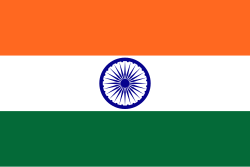| India at the 1986 Asian Games | |
|---|---|
 | |
| IOC code | IND |
| NOC | Indian Olympic Association |
| in Seoul | |
| Medals Ranked 5th |
|
| Asian Games appearances (overview) | |
India participated in the 1986 Asian Games held in Seoul, South Korea from September 20 to October 5, 1985. Ranked 5th with 5 gold medals, 9 silver medals and 23 bronze medals with a total of 37 over-all medals. [1] 4 of the 5 gold medals were won by P.T.Usha. Khajan Singh won a silver medal in men's 200m butterfly swimming, which was the only swimming medal for India at the Asian Games between 1951 and 2010.